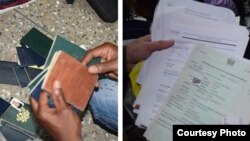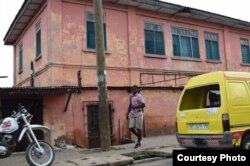The U.S. State Department on Monday said no one is known to have entered the United States on visas issued by a fake U.S. embassy that operated in Accra, Ghana, for a decade.
"They were duped, they were conned," the State Department's deputy spokesman, Mark Toner, said of those who paid thousands of dollars for the documents.
Ghanaian and Turkish organized crime rings ran the operation in collusion with a Ghanaian immigration and criminal law attorney, according to officials in Washington.
"We learned about it this year," despite the bogus diplomatic facility being in existence for 10 years, Toner told reporters.
An American flag flew outside the dilapidated pink building every Monday, Tuesday and Friday from 7:30 a.m. until noon. There were signs for the U.S. Embassy in Ghana, and a photo of President Barack Obama was displayed inside. Posing as U.S. consular officials, who spoke English and Dutch, were Turkish citizens, according to State Department officials.
Authorities say corrupt local officials were paid off to look the other way and, even more alarming, the bogus embassy managed to obtain legitimate blank documents.
"Some of the services the embassy provided for these customers included issuance of fraudulently obtained, legitimate U.S. visas, counterfeit visas, false identification documents [including bank records, education records, birth certificates, and others] for a cost of $6,000," according to a report written by Jennifer Froetschel in the State Department's diplomatic security public affairs office.
Operation Spartan Vanguard
It was revealed late last week that the fake embassy was finally shut down earlier this year as part of Operation Spartan Vanguard run by Diplomatic Security Service (DSS) agents at the real U.S. Embassy in Accra.
The operation is designed to crack down on trafficking and fraud plaguing American embassies throughout the region.
"Visa fraud has been a persistent security concern for years," said Fred Burton, chief security officer at Stratfor, a global intelligence company.
Burton told VOA that DSS agents historically "have had a tough time balancing never-ending protection and physical security demands, with document fraud investigations."
Burton, a former DSS deputy chief of counter-terrorism, praised his former colleagues for getting the fake embassy shut down once it was identified, but notes the case "also shows that many intelligence gaps on document fraud exist."
The gangs in Accra also utilized a dress shop and an apartment building, and advertised their services through billboards and fliers to people in Ghana, Ivory Coast and Togo.
Raids, arrests, warrants
Walk-in visa appointments were not accepted. The standard practice was for the conspirators to drive to remote parts of West Africa to find customers who then would be brought to Accra.
Raids by a task force of Ghanaian and U.S. authorities led to the arrest of several suspects, and the seizure of 150 passports from 10 countries, and legitimate and counterfeit visas from the United States, Europe, India and South Africa, as well as counterfeit identity documents, according to the State Department.
The dress shop acted as a front, with an industrial sewing machine used to re-create the binding on the fake passports.
Several suspects remain at large, but Ghanaian police have warrants for their arrest and plan to pursue them, according to U.S. officials who say the search for the Turkish organized crime group is also ongoing.
Officials say it would have been virtually impossible to use the fake documents to enter the United States because officers of Customs and Border Protection must match travelers' biometric information in a database that would have been recorded by legitimate embassies issuing visas.






